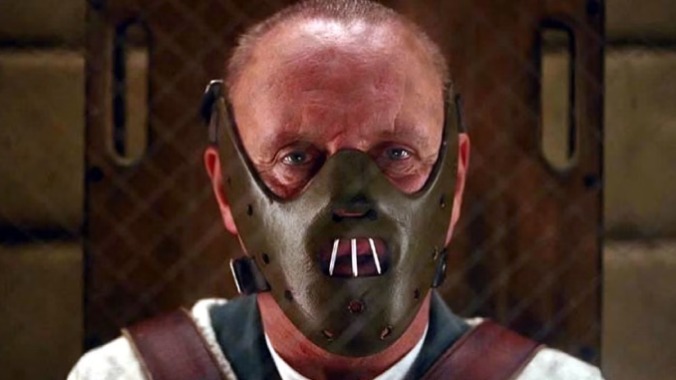Triple Threat: The Hannibal Trilogy
These films made Anthony Hopkins the face of serial killers

A story has a beginning, a middle, and an end. Maybe that’s why the trilogy is such a satisfying structure for so many epic series or curious corners of cinema history. This year in Triple Threat, Ken Lowe revisits another of cinema’s best trilogies each month, including some unofficial trilogies that have come to define a director, actor, or time in film history. You can follow the series here.
We must talk about “profiling,” that branch of police procedure which seeks to build a psychological profile of a criminal (usually one whose crimes are violent and seemingly random) to aid in catching them. Fiction is now full of brilliant detectives whose curse is that they get in the minds of the killers, and feel even closer to their evil quarry than they do their brother officers or the rest of us normal, non-serial-killer types who are seriously just trying to survive until we get our tax return back.
“He’s transforming,” the profiler, a cerebral but tortured detective type might say (and do, in two of the three movies I write about here). “He’s getting better, and he won’t stop!”
The trouble, as with all fictional hokum, is that profiling has pretty definitively been shown not to actually work. If you don’t believe me, there was a 2007 meta-study of it, which found “scant empirical evidence that [criminal profiling] is effective,” and went on to determine that while criminal profilers were more accurate than profiles of killers built by random folks off the street, they were barely more accurate. The current understanding among the scientific community is that this stuff is not worth the time.
It’s wrong to say that Jonathan Demme’s The Silence of the Lambs, based on Thomas Harris’ chilling novel, is solely at fault for perpetuating the mythical abilities of criminological profiling. In 1988, when Harris wrote the novel, America had been set up to be obsessed with this kind of subject matter. The Satanic Panic was in full swing, the Manson Family murders and the sensational trial in the wake of them was still fresh in the public’s memory, and the lurid careers of John Wayne Gacy and Ted Bundy had just come to an end. Growing up in this time, I remember that the fears around child safety were consumed by these kinds of boogeymen.
It was probably inevitable that some pop culture staple would revolve around serial killers, I think. But The Silence of the Lambs and its subsequent sequels completely rewrote how serial killers are portrayed in fiction, even as the science around the series’ central conceit has been basically debunked. We still have shows like Mindhunter, which revolve around the brilliant criminal profiler, and as with stuff like the various CSI shows, it’s probably actively harmful on some level for the TV-viewing public to be led to believe that any of this stuff is legitimate. Police and prosecutors make up enough stuff.
By virtue of their outsize influence, though, the Hannibal trilogy of films—an incredibly uneven but fun trilogy—are must-watches today, so long as you understand you are watching something akin to horror fantasy.
The Movies
Thomas Harris’ novels The Silence of the Lambs and Hannibal both put the character Clarice Starling front and center. She is not just the protagonist and one of the most important perspective characters. The themes of the novels, the deeper conflicts that Harris is prosecuting about gender and society, who is “normal” or “good” and who is “weird” or “evil,” hinge on her character. Jodie Foster stepped into the role in the 1991 film, which was actually the second adaptation of Harris’ series—I’m less interested in visiting Michael Mann’s 1986 film Manhunter, an adaptation of the novel Red Dragon and the first appearance of Hannibal Lecter (with his name spelled wrong, for some reason) in film.
What’s admirable is that The Silence of the Lambs solidly adopts Starling’s perspective. A young FBI trainee, Clarice is trying to outrun a traumatic past that saw her orphaned and then cast aside by extended family. It’s made explicit that she was raised a ward of the state, and that she feels some duty to that state, as she does to her father, a police officer slain in the line of duty. We watch as the men in the male-dominated spaces she moves through all leer at or underestimate her. Foster, a former child actor with a slight build, is perfect in the role.
Starling is tapped by her superior at the Bureau, Jack Crawford (Scott Glenn) to try to enlist the help of incarcerated serial killer and brilliant psychologist Hannibal Lecter (Anthony Hopkins) in reviewing a new psychological evaluation the Bureau plans to use on captured serial killers. It’s a pretext, though: Crawford really wants to entice Lecter to help them capture a serial killer who’s currently on the loose: “Buffalo Bill,” who has been kidnapping and skinning women all over the country.
-

-

-

-

-

-

-

-

-

-

-

-

-

-

-

-

-

-

-

-

-

-

-

-

-

-

-

-

-

-

-

-

-

-

-

-

-

-

-

-








































